The FPGAcademy educational materials are designed for use on the DE-series FPGA boards, which are designed specifically for use in laboratory exercises for Engineering and Computer Science courses. These boards can be obtained from the manufacturer at discounted prices for Academics (students and course instructors). There is also a limited donation program, which is available to qualified educational institutions through the Intel FPGA Academic Program.
Several categories of boards are available, depending on their intended use. Select the collapsible menus below to see the recommended boards.
This category of laboratory board includes an Intel® FPGA along with a generous set of basic input/output (I/O) features, like switches and lights, that support introductory topics in Digital Logic and Computer Organization. Each board has memory device(s) and various types of multimedia input/output ports, such as audio, video, Ethernet, USB, Accelerometer, and Analog-to-Digital converters. For Computer Organization courses, all boards support the use of soft processors implemented in the FPGA. Some boards feature an Intel® SoC FPGA device with an Arm Cortex-A9 dual-core processor, which supports laboratory exercises in both Computer Organization and Embedded Linux.
The DE1-SoC board provides a great set of features for use across a curriculum, including courses in Digital Logic, Computer Organization, Embedded Systems, and for use in Senior Projects. A summary of the DE1-SoC features and a set of resources supporting the board are given below. Complete details about this product can be obtained from the manufacturer, Terasic Technologies.
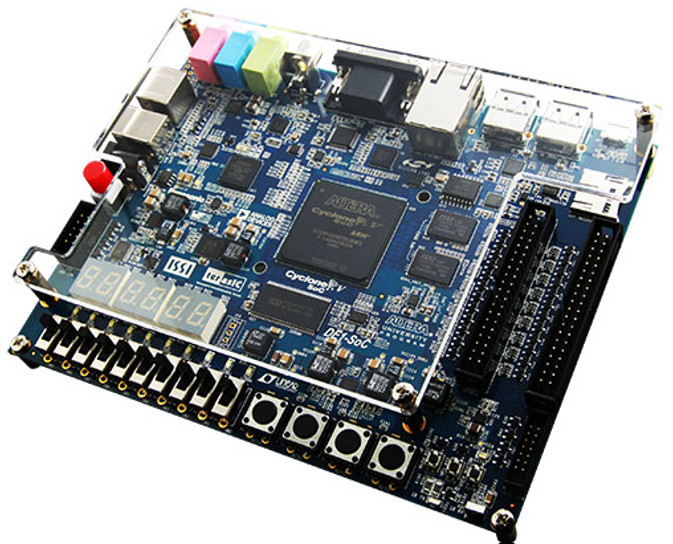
Main Features:
- Intel® Cyclone V SoC FPGA
- 85k logic-element FPGA
- ARM Cortex A9 MPCORE
- 1 GB DDR, 64 MB SDRAM
- Micro SD Card
Basic IO:
- 10 slide switches, 4 pushbuttons
- 10 LEDs, six 7-segment displays
IO Devices:
- Audio in/out
- VGA Video out, S-Video in
- Ethernet, USB, Accelerometer
- A/D converter, PS/2
| Resource | Download |
|---|---|
| User Manual | |
| DataSheets | ZIP |
| Intel® Quartus® Prime Settings File with Pin Assignments | QSF |
| Intel® Quartus® Synopsys Design Constraints | SDC |
The DE10-Standard board includes all of the features of the DE1-SoC, but with some enhancements: the FPGA and memory have higher capacities, there is a high-speed expansion-board connector and a small black-and-white display. A summary of the DE10-Standard features and a set of resources supporting the board are given below. Complete details about this product can be obtained from the manufacturer, Terasic Technologies.
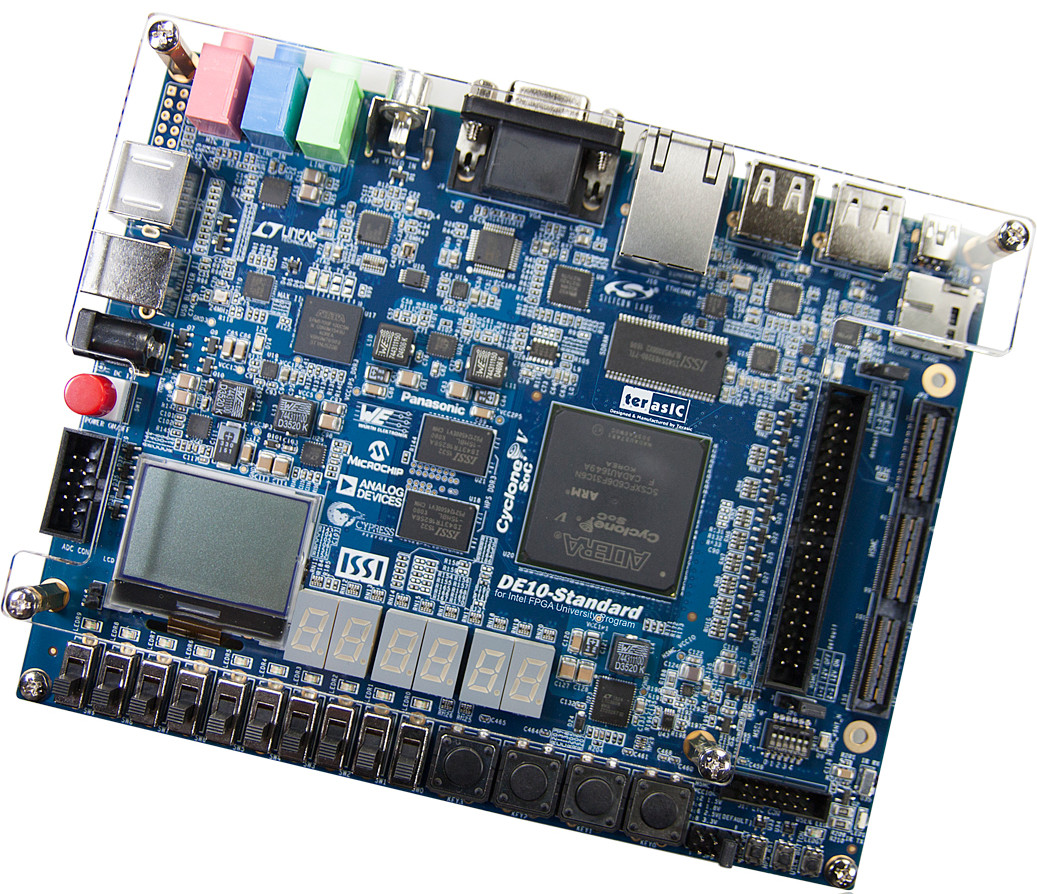
Main Features:
- Intel® Cyclone V SoC FPGA
- 110k logic-element FPGA
- ARM Cortex A9 MPCORE
- 1 GB DDR, 64 MB SDRAM
- Micro SD Card
Basic IO:
- 10 slide switches, 4 pushbuttons
- 10 LEDs, six 7-segment displays
IO Devices:
- Audio in/out
- VGA Video out, S-Video in
- 128 x 64 LCD
- Ethernet, USB, Accelerometer
- A/D converter, PS/2
| Resource | Download |
|---|---|
| User Manual | |
| DataSheets | ZIP |
| Intel® Quartus® Prime Settings File with Pin Assignments | QSF |
| Intel® Quartus® Synopsys Design Constraints | SDC |
The DE10-Lite board provides many of the features of the DE1-SoC board, but at a more affordable price point. This board provides a smaller FPGA, less memory capacity, lower-resolution VGA, and fewer types of input/output ports. The DE10-Lite is an excellent board for use in Digital Logic courses, and for Computer Organization courses that use soft processors (implemented in the FPGA). This board does not have an Arm processor, and cannot be used to run Linux. A summary of the DE10-Lite features and a set of resources supporting the board are given below. Complete details about this product can be obtained from the manufacturer, Terasic Technologies.
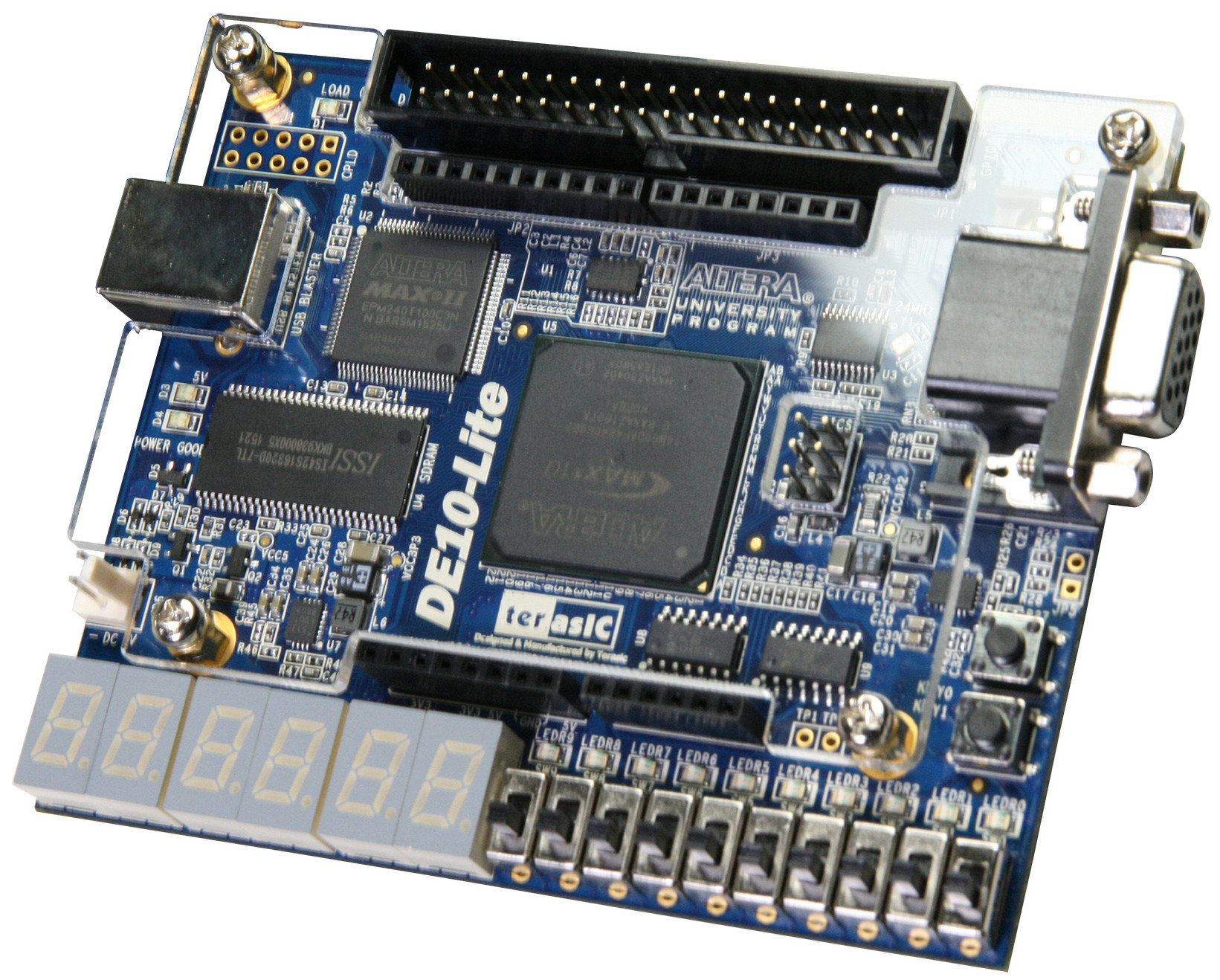
Main Features:
- Intel® MAX 10 FPGA
- 50k logic-element FPGA
- 64 MB SDRAM
Basic IO:
- 10 slide switches, 4 pushbuttons
- 10 LEDs, six 7-segment displays
IO Devices:
- VGA Video out
- Accelerometer
- A/D converter
- Arduino UNO R3 expansion connector
| Resource | Download |
|---|---|
| User Manual | |
| DataSheets | ZIP |
| Intel® Quartus® Prime Settings File with Pin Assignments | QSF |
| Intel® Quartus® Synopsys Design Constraints | SDC |
This category of laboratory board has an Intel® SoC FPGA, a few switches and lights, memory, and various multimedia ports: audio, video, Ethernet, USB, Accelerometer, and Analog-to-Digital converters. These boards have an Arm Cortex-A9 dual-core processor, making them suitable for Computer Organization courses, Embedded Linux, and Robotics applications (due to the small board size).
The DE10-Nano board provides a good set of features for use in courses in Computer Organization and Embedded Systems. A summary of the DE10-Nano features and a set of resources supporting the board are given below. Complete details about this product can be obtained from the manufacturer, Terasic Technologies.
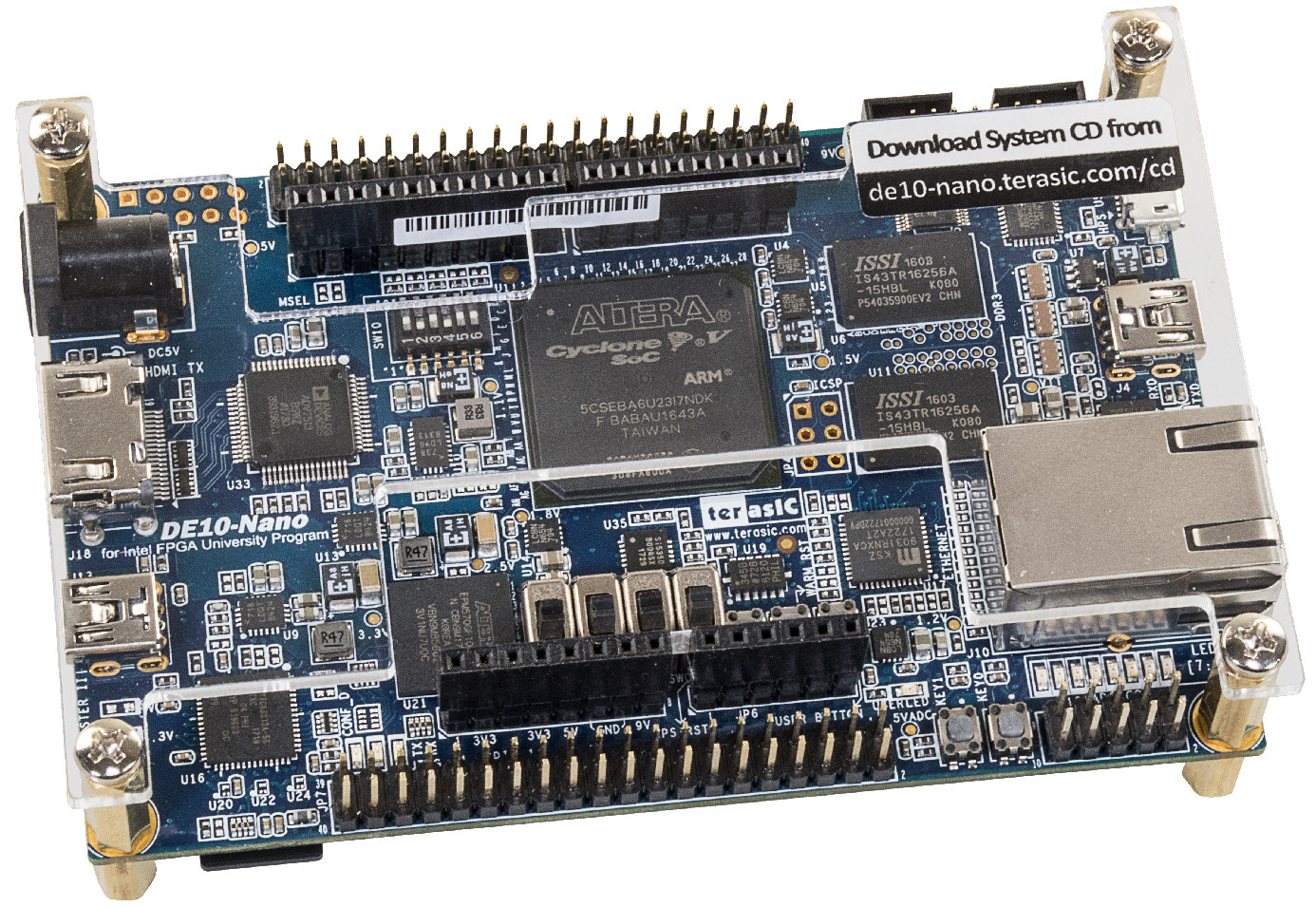
Main Features:
- Intel® Cyclone V SoC FPGA
- 110k logic-element FPGA
- ARM Cortex A9 MPCORE
- 1 GB DDR, 64 MB SDRAM
- Micro SD Card
Basic IO:
- 4 slide switches, 2 pushbuttons
- 8 LEDs
IO Devices:
- HDMI Video/Audio out
- Ethernet, USB, Accelerometer
- A/D converter
- Arduino UNO R3 expansion connector
| Resource | Download |
|---|---|
| User Manual | |
| DataSheets | ZIP |
| Intel® Quartus® Prime Settings File with Pin Assignments | QSF |
| Intel® Quartus® Synopsys Design Constraints | SDC |
A wide variety of laboratory boards are available for use in leading-edge research projects. These boards have advanced features, such as high-end Intel® FPGAs, high-capacity memories, and high-speed interconnection ports. A few representative examples of research-oriented boards are shown below.
The DE10-Agilex board features an Intel® Agilex FPGA, as depicted below. Complete details about this product can be obtained from the manufacturer, Terasic Technologies.
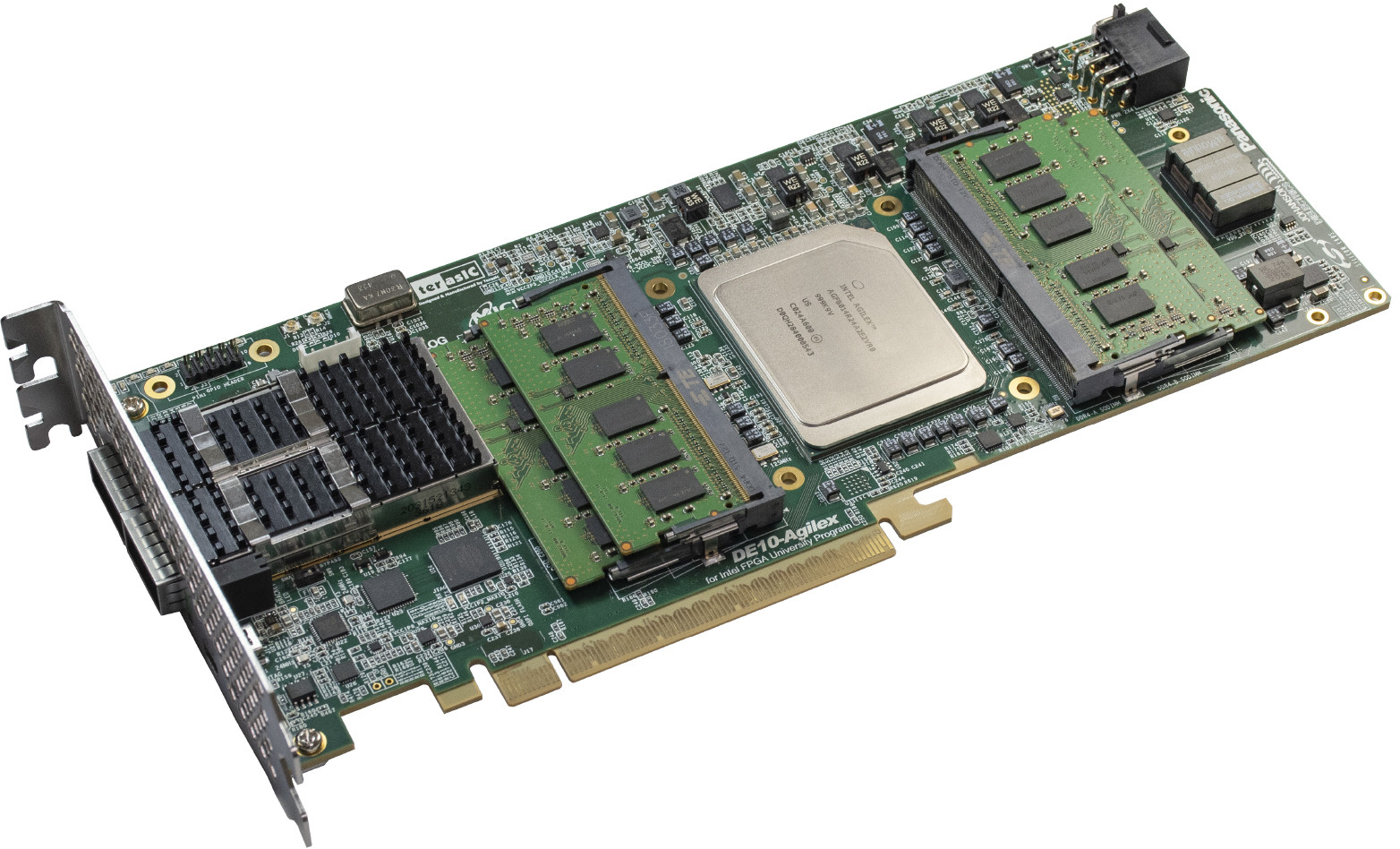
Main Features:
- Intel® Agilex FPGA
- 1.4M logic-element FPGA
- 32GB DDR4 SODIMM
High-speed IO:
- Two QSFPDD connectors for 200/100/40/25/10 GbE
- PCI Express Gen4 x16 edge connector
The DE10-Pro board features an Intel® Stratix 10 FPGA, as depicted below. Complete details about this product can be obtained from the manufacturer, Terasic Technologies.
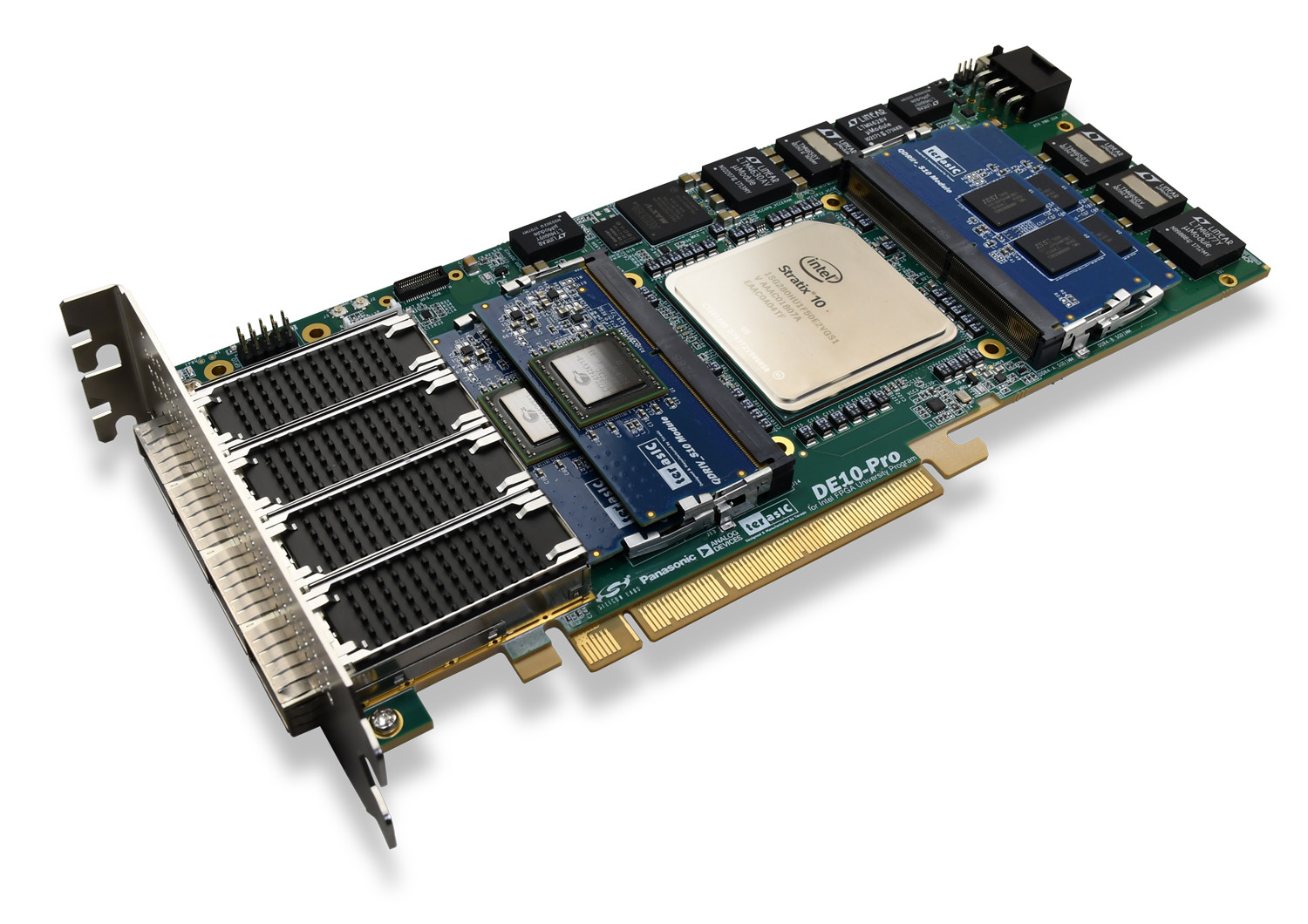
Main Features:
- Intel® Stratix 10 FPGA
- 2.8M logic-element FPGA
- Available with Arm Cortex-A53 quad-core
- Up to 8 GB DDR4 2666/2400 for each socket
High-speed IO:
- Four QSFP28 connectors for 100/40/25/10 GbE
- PCI Express Gen3 x16 edge connector
The DE5a-Net-DDR4 board features an Intel® Arria 10 FPGA, as depicted below. Complete details about this product can be obtained from the manufacturer, Terasic Technologies.
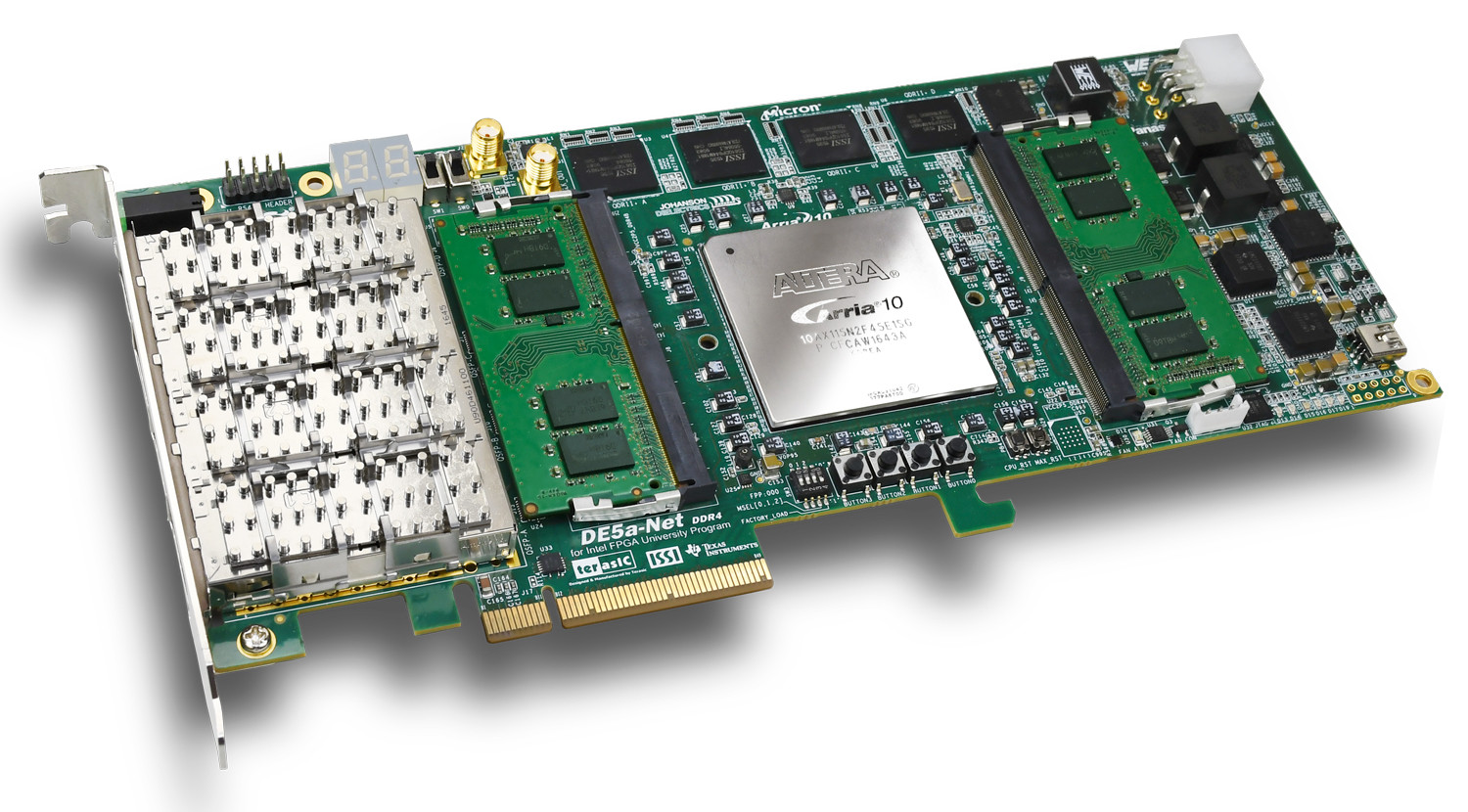
Main Features:
- Intel® Arria 10 FPGA
- 1.1M logic-element FPGA
- 2 DDR4 SODIMM Sockets, up to 16GB per socket
High-speed IO:
- Four QSFP+ connectors
- PCI Express (PCIe) x8 edge connector